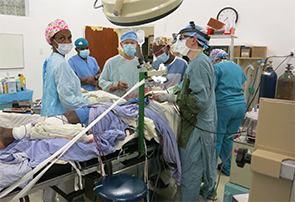
Intraoperative photo during microvascular anastamosis of fibula free flap at the Hospital Lumiere in Bonne Fin, Haiti.
Courtesy of Adam Luginbuhl, MD
“The University of Nairobi has the only ENT program in East Africa, and the goal for our collaboration is to provide excellent care and to expand Kenyan physician education in learning different techniques for managing disease in these kinds of environments,” said Dr. Bush. Because of limitations in resources at the teaching hospital, it can be difficult to provide timely access to surgical services for patients with chronic ear disease. “An overwhelming burden of patients with life-threatening head and neck cancers require prompt surgical management in their center; however, their limited access to operating room time and space has resulted in a backlog for patients with ear disease who needed treatment,” he said.
Explore This Issue
June 2016Working together with colleagues has been most rewarding, Dr. Bush said. “Even though we are physicians living in a totally different part of the world, the commonalities are striking. It’s a beautiful thing to develop a relationship with these people, learn from them, and help them—it makes our humanitarian efforts more meaningful and long lasting,” added Dr. Bush, who refers to Dr. Ayugi as the long-lost African brother he never knew he had. “As we develop a program, it’s not about us and our personalities but about the team that works together and finds new areas that need attention. We can focus on that as a group. Education is vital to changing the face of healthcare, and it’s exciting to have global partners in this type of mission,” he said.
Finding the Right Fit
Richard Wagner, MD, is the founder and acting director of Global ENT Outreach, which has worked in more than 25 developing countries to establish programs for those who suffer from ear diseases, teaching physicians to perform safe and effective surgical procedures, performing humanitarian surgery for the underserved, and helping to develop educational programs. Speaking from the Ukraine, Dr. Wagner said it takes a certain kind of personality—someone who wants to volunteer—and a mindset far different from what physicians are taught in the U.S. healthcare system.
Potential volunteers must have a deep desire to give back to these communities, and they need to be flexible and adaptable to working under conditions that would be considered unsuitable by U.S. standards, he said. “Many doctors who contact our organization think they are going to go and practice their surgical skills on somebody in an environment where they can practice or improve skills they should already have acquired and where there’s no malpractice to be concerned about, and that’s not what it’s about,” he added. “You need to be skilled and prepared and able to work outside your comfort zone to succeed. In the U.S., the mentality has developed that everything has to be perfect and you need to follow all the rules set forth by hospital bureaucracy and the legal community. Overseas, the rules of engagement are different in many respects, and adaptability and flexibility govern; you have to put the pieces together and sometimes develop things from scratch.”